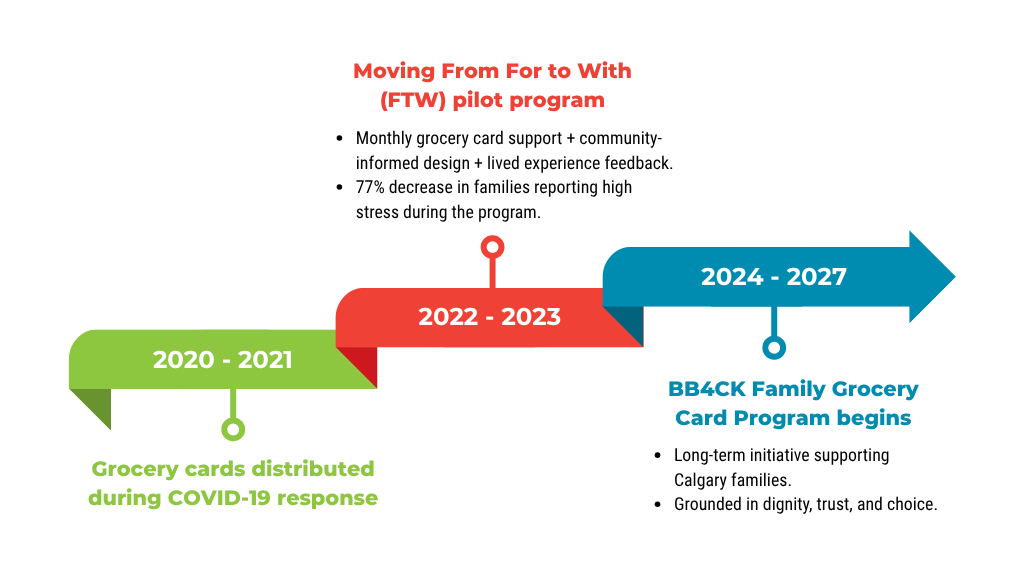
What We are Learning
We’re always learning from our community, especially from kids and families we support. By listening and building trust, we’ve shaped our programs and continue working with families to create more lasting, dignified approaches to addressing food insecurity.
Understanding Food Insecurity
Food insecurity is the experience of struggling to afford food. For many families, it looks like constant worry, compromising on quality and quantity or skipping meals altogether. In 2024, more than 10 million people, including 2.5 million children, were affected by food insecurity in the ten Canadian provinces.
In Alberta, it affects more families than ever:
- 31% of people live in households experiencing food insecurity in 2024.
- 1 in 3 children lives in a household experiencing food insecurity.
- 61% increase in food insecurity over the past five years.
Source: PROOF – University of Toronto
Explore our one-page about Food Insecurity to see how it’s defined and experienced in Alberta and Canada.
Moving Forward Together
Food insecurity affects thousands of kids and families right here in Calgary, but behind every statistic are real stories and lived experiences.
Moving Forward Together is a visual journey that captures everyday moments from families in BB4CK’s grocery card program. It is woven together with the powerful oral stories of two mothers. Their voices remind us of the strength, resilience, and humanity behind every experience with food insecurity and the importance of building a caring community in action.
Our Learning Journey

Our Path: Listening, Learning, Growing with Community
1 . How it started: Supporting families during COVID-19
In 2020, through to 2021, as part of our response to the COVID-19 pandemic, we provided grocery cards to families with kids learning from home. This allowed us to connect directly to families and learn what their individual needs were and how best we could support.
We’ve learned so much from listening to families and continue to invest our time in understanding our role in the food insecurity spectrum and how we can make a greater impact for kids and families.
2. Moving From For to With (FTW) Pilot Program
From 2022 to 2023, we launched Moving From For to With (FTW)—a 12-month pilot program shaped by community feedback and lived experience. Fifty families received consistent grocery card support and took part in monthly engagement opportunities, helping us co-design more dignified, trauma-informed ways to address food insecurity in Calgary.
Key Outcomes from FTW:
- 77% drop in families reporting high stress.
- Reduced food insecurity, reduced stress and increased feelings of dignity.
- The BB4CK Peer Advisory Council shaped future program development.
3. Introducing: The BB4CK Family Grocery Card Program
Building on everything we’ve learned, in October 2024, we launched the BB4CK Family Grocery Card Program – Moving forward together. This 3.5-year initiative works to reduce food insecurity, reduce stress and increase feelings of dignity for participating families.
Throughout the program, families are invited to share their experiences through monthly surveys, focus groups, and community conversations centred on connection, support, and belonging. These insights are helping us advocate for systemic change in Calgary’s emergency food assistance sector—shaping new approaches that are community-informed and dignified.
This program is:
- This is a closed, referral-based program—partner schools identify and connect families who would benefit from participation, helping ensure the program remains grounded in trust and community relationships.
- Rooted in dignity, transparency, evidence-based design, participatory approach and storytelling for change.
- Committed to sharing learnings to advocate for systemic improvements in Calgary’s emergency food assistance sector and beyond.
